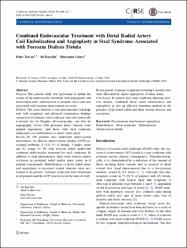Combined Endovascular Treatment with Distal Radial Artery Coil Embolization and Angioplasty in Steal Syndrome Associated with Forearm Dialysis Fistula
Özet
The present study was performed to define the results of the endovascular treatment with angioplasty and distal radial artery embolization in ischemic steal syndrome associated with forearm arteriovenous accesses. The cases referred to our interventional radiology unit with symptoms and physical examination findings suggestive of ischemic steal syndrome were retrospectively evaluated first by Doppler ultrasonography, and then by angiography. Cases with proximal artery stenosis were applied angioplasty, and those with steal syndrome underwent coil embolization to distal radial artery. Of 589 patients who underwent endovascular intervention for dialysis arteriovenous fistulae (AVF)-associated problems, 6 (1.01 %) (5 female, 1 males; mean age 62 (range 41-78) with forearm fistula underwent combined endovascular treatment for steal syndrome. In addition to steal phenomenon, there were stenosis and/or occlusion in proximal radial and/or ulnar artery in 6 patients concurrently. Embolization of distal radial artery and angioplasty to proximal arterial stenoses were performed in all patients. Ischemic symptoms were eliminated in all patients and the AVF were in use at the time of study. In one patient, ischemic symptoms recurring 6 months later were alleviated by repeat angioplasty of ulnar artery. In palmar arch steal syndrome affecting forearm fistulae, combined distal radial embolization and angioplasty is also an effective treatment method in the presence of proximal radial and ulnar arterial stenoses and occlusions.


















